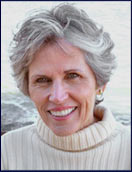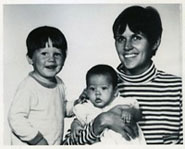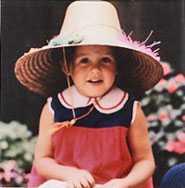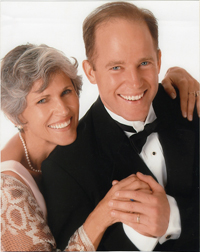Today in part two of a two-part interview, SevenPonds speaks with Carol Kearns, a retired psychologist who specialized in recent loss issues. Carol lost her own daughter, Kristen, when her daughter was seven years old, and has since dedicated her life to helping others through crisis and sudden loss for the past 30 years. She is the author of Sugar Cookies and a Nightmare – a memoir about loss.
Marissa: You talk about creating meaning from a sudden loss of a child, especially for parents who lost children to drugs or alcohol. Would you say that’s the most important thing for grieving parents to do?
Carol: Not initially. I would say that’s your goal down the line. Look at your child. Look at what was important to your child. Realize that no matter what, there was a gift. That’s what we grieve about that child. Their uniqueness. What was it? Was it that they cared? Was it that they were really smart? Sometimes you have to dig a little bit, especially if your child has been on the street with drug addiction for a long time. You feel like, “My child has been a bloody nightmare. There wasn’t anything redeeming there.” And yet if you can go back and say, “Wait a minute, I held that little bundle, and that was pretty precious.” Addiction is not a choice. Somewhere in there, there is still a beautiful soul, and you’re gonna have to find it. They may have to work through a lot of pain and anger first.
Marissa: So parents need to deal with their emotions, then find meaning.
Carol: Right. Take a newborn like Emma (Carol’s granddaughter who died as an infant). What did she give? She gave the greatest gift of all. We will never forget Emma. She gave us unconditional love. That is the highest form of love. Newborns, that is the greatest gift before their little soul leaves. They just flood you with love, and they haven’t even taken a breath. To carry Emma’s love forward is really powerful. Most of us have so many conditions about, “Well I will love you if you clean your room, and I will really love you if you do this for me.” If you’re like Emma, you just say, “Well, I just love you.” It’s so beautiful.
Marissa: What about losing a child is unique compared to all other types of loss?
Carol: What you lose is not just their past, but it’s their future. We all have dreams for our children. We go to the wedding of a niece, who was the same age as Kristen (Carol’s daughter who died at age seven), and you know if Kristen were here, she would be a bridesmaid. You see their friends graduating from high school and going on to have careers, and you know that’s exactly what she would have done. And she didn’t get to do it. I remember before Krissie died, she was so excited because she had her new Bluebird uniform. She was so excited for her next meeting, and she never made it. She wore the uniform a few times before the meeting, just to try it out. So just seeing a little Bluebird uniform on a little girl, I think, “Wow, Krissie never got to do that.” When Emma died, we were all in the living room, and Michel (Carol’s son) said, “Mom, if Krissie were here, she’d be sitting right here with me right now.” She’s always there, in some future form that didn’t happen.
Marissa: Parents mourn the future then.
Carol: You wonder what she would have done. Would she have married? Would she have had any children? All of these questions that of course have no answers. That’s what a parent grieves, is that future.
Marissa: How do you overcome that feeling?
Carol: There are several ways you can deal with it. One is initially when this happens, kids sometimes have special clothes, like favorite dresses or whatever. I remember giving Krissie’s best friend her favorite dress. When I first saw the little girl in the dress, it kind of spooked me. At the same time, I had to say to myself, “Look, it’s Krissie’s dress. It was her favorite. She would want Heidi to have it, so get over it.” (laughs) This could not be a better scenario for this dress. I just talk to myself and say, “Really, Carol? Look how happy she is, and imagine how happy Krissie would be knowing she has her favorite dress.”
About 15 years after her death, at a wedding, one of the aunts came up and said, “Krissie’s supposed to be here.” We all cried, but then we just went on. Yes, she’s not here. Yes, she’s supposed to be here, but that wasn’t the plan. God has a different plan. He might be running the show, but it’s OK to get angry at Him. And I did, I was furious. That is a process. It doesn’t just happen. Sometimes when things get painful, I write a letter. I say, “Krissie, sometimes I get so upset when I see dandelions. You used to pick them all the time for me, and those were your favorite flower. Everyone thought they were weeds, but you thought they were beautiful flowers. Every time I see them now it makes me so mad.” I let myself have it. Just say, “I miss having dandelions.” Life goes on. Tides and time stop for no man, and boy, you get lost in the shuffle. You have to choose life, Marissa. You just have to choose it.
Marissa: Would you say it’s important for parents to feel angry when that emotion comes up? To let it through?
Carol: Absolutely. Elisabeth (Kubler-Ross) taught me how to get angry. I was so afraid of it for three reasons. When you were young and angry, you were punished and sent to your room. It was not a good thing. Also, what good does it do to get angry? I need my energy to go forward. All the anger in the world is not bringing her back. The other thing was, I don’t want to get angry at God. What if He gets mad and takes Michel too? It was weird thinking. Especially women have a hard time with anger. We get into a real depression. That depression is usually sitting on a ton of anger that just shuts you down.
Marissa: It seems that women aren’t taught to express anger. We’re taught to take on the role of caretaker, rather than being seen as vulnerable or angry.
Carol: I completely agree. We’re the nice ones. We make everything OK. Sometimes it’s just bloody not OK. I worked with corporations, and would focus on what employees do when they have a sudden loss. What does a company do? They can’t be expected to be back at work in a month or six weeks. A lot of people who I counseled would work with things like, if you don’t want to fall apart in a meeting, and something is coming up about your loved one, we’re very trainable as adults. We can say “I don’t need to do this now. I’m going to take 15 minutes to scream out my anger into a pillow, or tear up yellow pages.” Anger is so physical. We keep packing it on until finally we blow up. We’re humans; we’re not robots. We feel.
Marissa: Thank you for speaking with us!
Carol: Thank you!
Read part one of our two-part interview with Carol Kearns right here.

 How Does Anger Help You Heal After Losing a Child? An Interview with Carol Kearns, Part Two
How Does Anger Help You Heal After Losing a Child? An Interview with Carol Kearns, Part Two






 “In Case You Don’t Live Forever” by Ben Platt
“In Case You Don’t Live Forever” by Ben Platt
 Our Monthly Tip: Make an “In Case of Death” File to Ease Loved One’s Grief
Our Monthly Tip: Make an “In Case of Death” File to Ease Loved One’s Grief
 Passing of Beloved Comedian Births a New Comedy Festival
Passing of Beloved Comedian Births a New Comedy Festival














